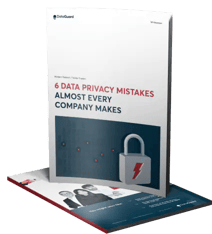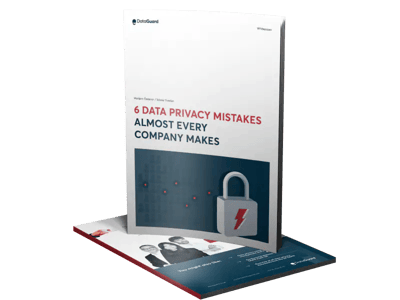Data privacy is a priority. With data being used in ways we often can’t see, protecting it is no longer optional. Individuals need more control, and businesses must proactively safeguard consumer data by embedding privacy into their practices. But effective solutions don’t just tick boxes—they adapt to evolving standards and manage real risks.
This article explores key statistics that reveal the scale of data breaches, the growing impact of regulations, and how consumers view privacy. Whether you're looking to secure your own data or enhance your company’s privacy practices, these insights will help you navigate the changing privacy landscape.
What is data privacy?
Data privacy is the right of individuals to keep their data private and control how it is used by the companies that collect and share information about individuals. It also covers things like consent and preference management and how organizations use consent and preference management platforms.
To create awareness around data privacy in the digital space, Data Privacy Week was created by the National Cybersecurity Alliance (NCA), and it is held from January 22 to 28th. This week is an opportunity for us all to learn how to protect ourselves online, including taking steps to prevent identity theft or cyberattacks.
Here are 30 data privacy statistics for 2023
1. 63% of consumers worldwide think companies aren't honest about how they use their personal information, and nearly 48% have stopped purchasing from companies because of privacy worries. (Tableau)
2. 33% of users have cut ties with companies because of privacy concerns. They stopped using social media, internet service providers, stores, credit card firms, and financial institutions. (Cisco)
3. On average, hackers target internet-connected PCs every 39 seconds. (The University of Maryland)
4. More than 120 nations have adopted some version of international data protection rules to help safeguard their citizens' personal information. (Thales)
Data privacy insights for businesses
Privacy has become an increasingly important conversation among companies. It is mainly due to the rapid expansion of data privacy regulations worldwide, ransomware attacks, and consumer concerns about the commercial use of personal data.
5. 79% of US adults report being concerned about how companies use their data. Being open about how you use data, along with respecting privacy can give you a competitive edge. (Pew Research Centre)
6. Companies witness an average return on investment (ROI) of 1.8% from their privacy-related expenditures, and 92% acknowledge they have a moral obligation to use consumer data honestly and transparently. (Cisco)
7. 97% of companies saw benefits such as competitive advantage or investor appeal from their privacy investments in the past year. (LXA)
8. 60% of consumers say they would spend more money with a brand they trust to handle their personal data responsibly. (Truata)
9. 70% of risk and compliance experts said the pandemic had increased their reliance on technology to improve decision-making, performance monitoring, and risk management. (Thomson Reuters)
10. 11% of companies took up to 6 months or a year (5%) to inform the consumer about a data breach. (Consumer Digital Trust Index)
Consumers’ privacy is one of the most important aspects of doing business, so understanding consumer expectations and needs concerning data privacy is the next step.
Data privacy insights for consumers
Even though over 130 countries have enacted privacy regulations, consumers still aren't confident that their personal data is safe. They want companies to be more transparent about how they use consumers’ personal data, even when laws and regulations provide safeguards and principles.
11. When collecting data, 74% of UK consumers hold a greater level of distrust towards social media giants (Statista).
12. 33% of global consumers have experienced a data breach (Consumer Digital Trust Index).
13. 46% of consumers believe they cannot sufficiently protect their data, with the biggest cause being a lack of understanding of the nature, purpose, and use of their data by companies (Cisco Privacy Survey).
14. 51% of consumers who want to conceal their online activities from future visits or searches do so by switching to "private" or "incognito" mode in their web browser (Aspen Digital).
15. Virtual private networks (VPNs) are used by 35% of users to access the internet on their devices (such as laptops, smartphones, and tablets). (Aspen Digital)
16. 32% of US consumers think they should have more control over who has access to their personal information online. (Aspen Digital)
17. 78% of consumers are most protective of their financial data. (RSA)
18. Many consumers feel they are not getting enough information about how companies utilise their data. 43% of consumers reported data insecurity and 79% find it too complex to track how different companies use their personal data. (Cisco Privacy Survey)
19. 54% of consumers believe companies should be forced into mandatory data protection controls like encryption and two-factor authentication following a data breach. (Consumer Digital Trust Index)
Now that you better understand data privacy related to companies and consumers, let's look at international laws and regulations.
Data privacy laws and regulations insights
Privacy protection has quickly become one of the most important things for companies worldwide. Most countries now have laws protecting personal data, and people are less likely to do business with companies that don't take privacy seriously.
20. 71% of countries around the world have data privacy legislation, and only 15% do not. (UNCTAD)
21. 66% of US consumers want the government to adopt privacy laws like the GDPR. (Persona)
22. Between January 2021 and January 2022, nearly €1.1 billion in fines were issued for a wide range of GDPR violations. That represents a 594% annual increase in fines. (DLA Piper)
23. At least 20 countries (outside the European Union) have enacted laws similar to the GDPR. These countries are located on every continent of the world. (Reed Smith)
24. New laws in New York City and California regulating the use of AI and personal data are set to be into effect by January 1, 2023. (Cybersecurity Dive)
Now let's look at some recent changes and trends in cybercrime.
Data privacy and cybercrime insights
The global cybersecurity landscape has witnessed significant changes in recent years, from increased cybercrime threats to the global economic turmoil that has shifted the privacy world entirely.
Here are some of the most critical cybercrime insights over recent years:
25. In December 2022, investment fraud was the most expensive type of cybercrime, with victims losing an average of $70,811 per victim. (AAG)
26. In 2022, the average cost of a data breach worldwide was $4.35 million, up from $4.24 million in 2021. When comparing the average cost of a data breach across industries, the healthcare sector has the highest average cost. (Statista)
27. Attacks using ransomware remain a significant concern for individuals and companies, especially as attackers use increasingly sophisticated methods to extort money from victims. In the first half of 2022, there were around 236.1 million ransomware assaults reported worldwide. (AAG)
28. When comparing breaches with and without remote work, the average cost of a breach with remote work was an additional $1.07 million. (IBM)
29. The frequency and financial impact of data breaches are clearly on the rise. On average, there have been 97 victims every hour on average since 2001, a 1517% rise in casualties over the previous two decades. (AAG)
30. As the cyber threat continues to grow, more companies are starting to take cyber security seriously. 73% of SMBs agree that cyber security concerns now require action, and 78% say they plan to boost cyber security spending in the next 12 months. (AAG)
Ready to simplify your compliance?
Data privacy is no longer just a compliance issue — it’s a business imperative. As regulations tighten and breaches become more frequent, companies need solutions that do more than tick boxes. The organizations that stay ahead are those that manage real risks and adapt efficiently to evolving standards.
By adopting a risk-first approach, you’re not only protecting data but also building trust, resilience, and long-term growth. Prioritizing privacy isn’t just about meeting requirements; it’s about securing your business and your customers’ confidence in a constantly changing landscape.








